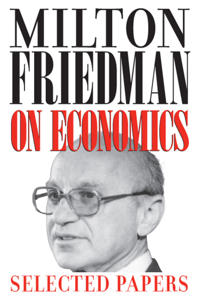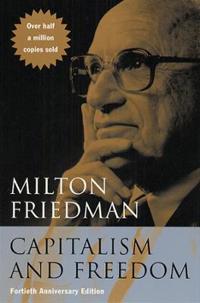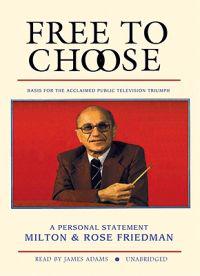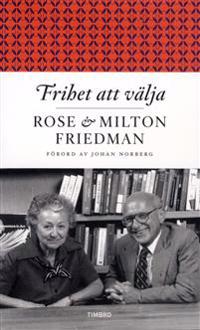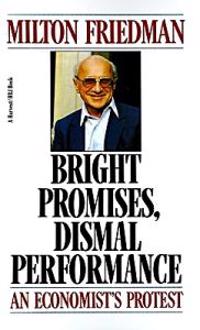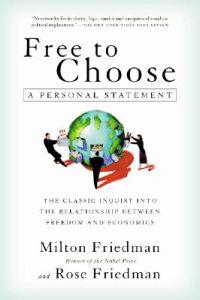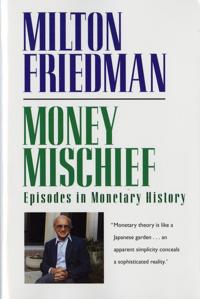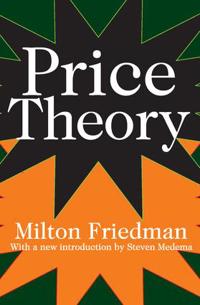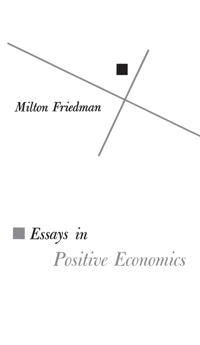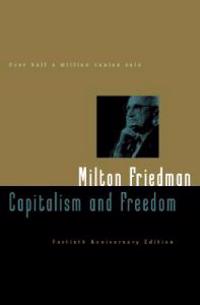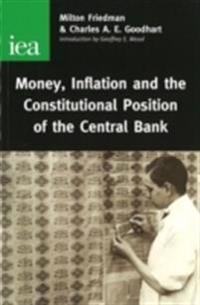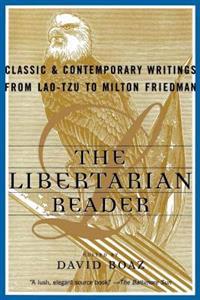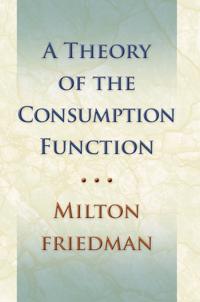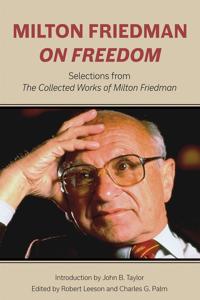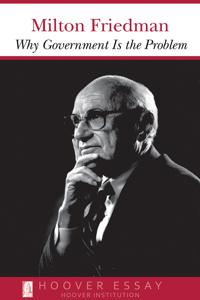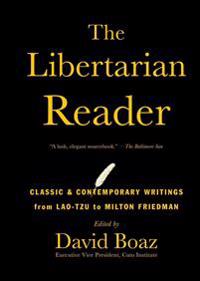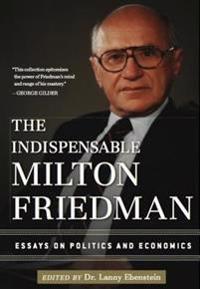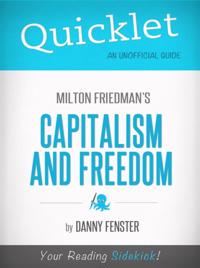Milton Friedman on Economics (Pocket)
avMilton Friedman, Gary S. Becker, Milton Friedman
ISBN: 9780226263496 - UTGIVEN: 200802Upon his death in the autumn of 2006, Milton Friedman was lauded as "the grandmaster of free-market economic theory in the postwar era" by the "New York Times" and "the most influential economist of the second half of the twentieth century" by the "Economist". Winner of the Nobel Prize in Economics [...]
Capitalism and Freedom (Pocket)
avMilton Friedman, Rose D. Friedman, Milton Friedman
ISBN: 9780226264219 - UTGIVEN: 200211It is a rare professor who greatly alters the thinking of his professional colleagues. It's an even rarer one who helps transform the world. Friedman has done both." - Stephen Chapman, Chicago Tribune How can we benefit from the promise of government while avoiding the threat it poses to individual [...]
Frihet att välja : ett personligt inlägg (Pocket)
avMilton Friedman, Rose Friedman
ISBN: 9789175667393 - UTGIVEN: 201011I Frihet att välja sammanfattar Milton och Rose Friedman sin syn på människan, staten och ekonomin. genom en resa i tid och rum visar de vilka fantastiska ting människan är kapabel till om hon får frihet över sitt eget liv, men också vilka katastrofer hon kan ställa till med. De förklarar [...]
Bright Promises, Dismal Performance: An Economist's Protest (Häftad)
avMilton Friedman, William R. Allen, William R. Allen
ISBN: 9780156141611 - UTGIVEN: 198305The Nobel Prize winner writes here on current issues of prevailing concern to every American citizen and taxpayer, displaying the powers of analysis and expression that have made him one of the most widely respected economists in America. Edited and with an Introduction by William R. Allen.
[...]Free to Choose: A Personal Statement (Häftad)
avMilton Friedman
ISBN: 9780156334600 - UTGIVEN: 199011Argues that free-market forces work better than government controls for achieving real equality and security, protecting consumers and workers, providing education, and avoiding inflation and unemployment.[...]
Price Theory (Häftad)
avMilton Friedman
ISBN: 9780202309699 - UTGIVEN: 200703Economics is sometimes divided into two parts: positive economics and normative economics. The former deals with how the economic problem is solved, while the latter deals with how the economic problem should be solved. The effects of price or rent control on the distribution of income are problems [...]
Essays in Positive Economics (Häftad)
avMilton Friedman
ISBN: 9780226264035 - UTGIVEN: 196608"Stimulating, provocative, often infuriating, but well worth reading."--Peter Newman, "Economica"
"His critical blast blows like a north wind against the more pretentious erections of modern economics. It is however a healthy and invigorating blast, without malice and with a sincere rega[...]Capitalism and Freedom (Inbunden)
avMilton Friedman
ISBN: 9780226264202 - UTGIVEN: 200212It is a rare professor who greatly alters the thinking of his professional colleagues. It's an even rarer one who helps transform the world. Friedman has done both." - Stephen Chapman, Chicago Tribune How can we benefit from the promise of government while avoiding the threat it poses to individual [...]
Money, Inflation and the Constitutional Position of Central Bank (Inbunden)
avMilton Friedman, Charles A. E. Goodhart
ISBN: 9780255365383 - UTGIVEN: 200304There are at least three requirements for an economy to maintain stable prices. Policy markers and opinion formers must understand that inflation brings no medium or long-term economic benefit; the causes of inflation -- monetary growth -must be also be understood; and there needs to be a stable and[...]
Monetary Versus Fiscal Policy (Häftad)
avMilton Friedman, Walter W. Heller
ISBN: 9780393098471 - UTGIVEN: 196904The Libertarian Reader: Classic and Contemporary Writings from Lao-Tzu to Milton Friedman (Häftad)
ISBN: 9780684847672 - UTGIVEN: 199802The first collection of seminal writings on a movement that is rapidly changing the face of American politics, The Libertarian Reader links some of the most fertile minds of our time to a centuries-old commitment to freedom, self-determination, and opposition to intrusive government. From John Locke[...]
A Monetary History of the United States, 1867-1960 (Häftad)
avMilton Friedman, Anna Jacobson Schwartz
ISBN: 9780691003542 - UTGIVEN: 197111Writing in the June 1965 issue of the "Economic Journal", Harry G. Johnson begins with a sentence seemingly calibrated to the scale of the book he set himself to review: 'The long-awaited "Monetary History of the United States" by Friedman and Schwartz is in every sense of the term a monumental scho[...]
The Great Contraction 1929-1933 (Häftad)
avMilton Friedman, Anna Jacobson Schwartz
ISBN: 9780691137940 - UTGIVEN: 200808Friedman and Schwartz's "A Monetary History of the United States, 1867-1960", published in 1963, stands as one of the most influential economics books of the twentieth century. A landmark achievement, the book marshalled massive historical data and sharp analytics to support the claim that monetary [...]
Theory of the Consumption Function (Häftad)
avMilton Friedman
ISBN: 9780691138862 - UTGIVEN: 200807What is the exact nature of the consumption function? Can this term be defined so that it will be consistent with empirical evidence and a valid instrument in the hands of future economic researchers and policy makers? In this volume, a distinguished American economist presents a new theory of the c[...]
Milton Friedman on Freedom
ISBN: 9780817920340 - UTGIVEN: 2017-04In this book, Robert Leeson and Charles Palm have assembled an amazing collection of Milton Friedman's best works on freedom. Even more amazing is that the selection represents only 1 percent of the 1,500 works by Friedman that Leeson and Palm have put online in a user-friendly format-and an even sm[...]
Why Government Is the Problem (Häftad)
avMilton Friedman
ISBN: 9780817954420 - UTGIVEN: 199302"The major social problems of the United States--deteriorating education, lawlessness and crime, homelessness, the collapse of family values, the crisis in medical care--have been produced by well-intended actions of government. That is easy to document. The difficult task is understanding why gover[...]
Milton Friedman
ISBN: 9780857190369 - UTGIVEN: 2011-04"One of the most important economic thinkers of all time". (Paul Krugman). Milton Friedman changed the world. From free markets in China to the flat taxes of Eastern Europe, from the debate on drugs to interest rate policy, Friedman's skill for vivid argument and ideas led to robust and often succes[...]
MILTON FRIEDMAN (Häftad)
ISBN: 9781441158314 - UTGIVEN: 2013-09Milton Friedman (1912-2006) was one of the most important 20th century advocates of libertarian and conservative ideas in academia and amongst the wider public. He made a critical contribution to the development of the free market and monetarist economics that challenged the dominant interventionist[...]
The Indispensable Milton Friedman: Essays on Politics and Economics (CD-bok)
ISBN: 9781470826710 - UTGIVEN: 2012-10The Libertarian Reader: Classic & Contemporary Writings from Lao-Tzu to Milton Friedman (Häftad)
avDavid Boaz
ISBN: 9781476752891 - UTGIVEN: 2015-02"The most magnificent collection of libertarian writings ever published" (Laissez Faire Books).
An important collection of seminal writings on a movement that is rapidly changing the face of American politics, "The Libertarian Reader" links some of the most fertile minds of our time to a centuri[...]Milton's Secret (Inbunden)
avEckhart Tolle, Robert S. Friedman, Frank Riccio
ISBN: 9781571745774 - UTGIVEN: 200811The Indispensable Milton Friedman (Inbunden)
avLanny (EDT) Ebenstein
ISBN: 9781596988088 - UTGIVEN: 2012-10Milton Friedman is one of the most famous economists in history. His writings and theories on everything from capitalism and freedom to deregulation and welfare have inspired movements, influenced government policies, and changed the course of America's economic history. Now, acclaimed Friedman bio[...]
Quicklet on Capitalism and Freedom by Milton Friedman
ISBN: 9781614641353 - UTGIVEN: 2012-01DescriptionQuicklets: Learn more. Read Less.About Milton FriedmanMilton Friedman was a Nobel prize-winning American economist and academic from the University of Chicago. He advised president Ronald Reagan, and his theories on limited government and free markets influenced politics well after Reagan[...]

